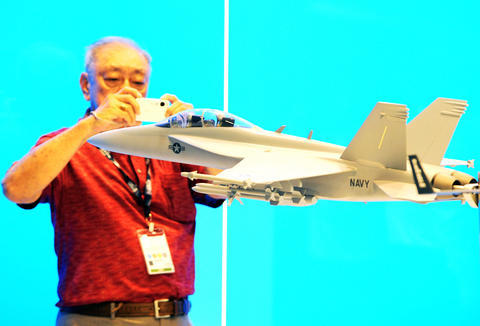The Singapore Airshow saw more than US$13.4 billion in sales of aircraft and related equipment this week, thanks to a booming aviation market, organizers have said.
Another US$2.6 billion was generated from contracts for facilities and other services, they said in a statement issued late on Friday, at the inaugural event.
The small but wealthy city-state decided to host its own airshow after organizers of the Asian Aerospace fair moved the event to Hong Kong.

PHOTO: AFP
The biggest deal that was announced at the airshow was an order for 56 Boeing 737-900ER aircraft worth more than US$4.4 billion by Indonesian low-cost carrier Lion Air.
Indonesian flag-carrier Garuda ordered four Boeing 777-300ERs worth US$1 billion and business jet operator BJets signed a US$600 million contract for 40 Cessna and Hawker jets.
US-based Boeing's European rival said it had secured orders for five A330-200F cargo planes from BOC Aviation, an aircraft leasing firm fully owned by Bank of China (
The deal is worth a total of US$877 million at catalog prices.
"The new deals announced at the airshow demonstrate once again that Asia is the world's fastest-growing aerospace market," said Jimmy Lau, managing director of the event's organizers.
He said 70 percent of the exhibitors have already confirmed bookings for the biennial event in 2010 being held at a new seaside location near Changi Airport.
Lau promised "an even bigger and better" show in 2010, saying this year's event already had 40 percent more exhibition area than Asian Aerospace which was last held in Singapore in 2006 and saw US$15.2 billion in deals.
More than 30,000 accredited industry professionals visited the airshow and numbers were expected to grow as opened to the public at the weekend.
Organizers have dubbed the Singapore Airshow as Asia's biggest aerospace event because it has civilian and defense components, while Asian Aerospace has focused on commercial aviation after its shift to Hong Kong.
More than 800 exhibitors from 42 countries, including US defense firms Lockheed Martin and Northrop Grumman, took part in the airshow that featured the latest warplanes, unmanned aerial vehicles and executive business jets.
"Asia is a vital market for us and it has been our constant endeavor to establish and strengthen our ties with this dynamic region," said Bernard Buisson, Singapore managing director for EADS, which owns Airbus.

Quanta Computer Inc (廣達) chairman Barry Lam (林百里) is expected to share his views about the artificial intelligence (AI) industry’s prospects during his speech at the company’s 37th anniversary ceremony, as AI servers have become a new growth engine for the equipment manufacturing service provider. Lam’s speech is much anticipated, as Quanta has risen as one of the world’s major AI server suppliers. The company reported a 30 percent year-on-year growth in consolidated revenue to NT$1.41 trillion (US$43.35 billion) last year, thanks to fast-growing demand for servers, especially those with AI capabilities. The company told investors in November last year that

Intel Corp has named Tasha Chuang (莊蓓瑜) to lead Intel Taiwan in a bid to reinforce relations between the company and its Taiwanese partners. The appointment of Chuang as general manager for Intel Taiwan takes effect on Thursday, the firm said in a statement yesterday. Chuang is to lead her team in Taiwan to pursue product development and sales growth in an effort to reinforce the company’s ties with its partners and clients, Intel said. Chuang was previously in charge of managing Intel’s ties with leading Taiwanese PC brand Asustek Computer Inc (華碩), which included helping Asustek strengthen its global businesses, the company

Taiwanese suppliers to Taiwan Semiconductor Manufacturing Co. (TSMC, 台積電) are expected to follow the contract chipmaker’s step to invest in the US, but their relocation may be seven to eight years away, Minister of Economic Affairs J.W. Kuo (郭智輝) said yesterday. When asked by opposition Chinese Nationalist Party (KMT) Legislator Niu Hsu-ting (牛煦庭) in the legislature about growing concerns that TSMC’s huge investments in the US will prompt its suppliers to follow suit, Kuo said based on the chipmaker’s current limited production volume, it is unlikely to lead its supply chain to go there for now. “Unless TSMC completes its planned six

TikTok abounds with viral videos accusing prestigious brands of secretly manufacturing luxury goods in China so they can be sold at cut prices. However, while these “revelations” are spurious, behind them lurks a well-oiled machine for selling counterfeit goods that is making the most of the confusion surrounding trade tariffs. Chinese content creators who portray themselves as workers or subcontractors in the luxury goods business claim that Beijing has lifted confidentiality clauses on local subcontractors as a way to respond to the huge hike in customs duties imposed on China by US President Donald Trump. They say this Chinese decision, of which Agence